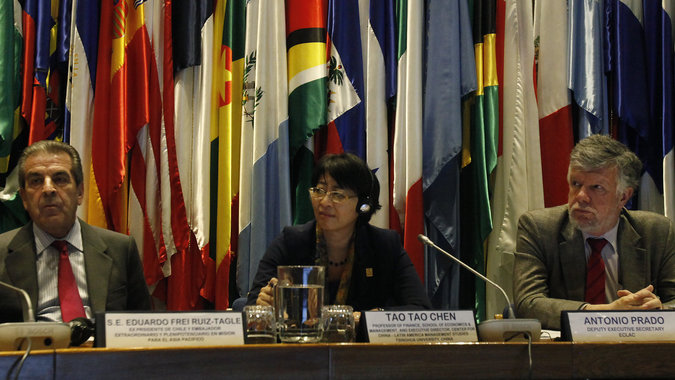Authorities and Experts Advocate for Diversifying Trade and Investments between China and Latin America
Work area(s)
Increasing cooperation and dialogue between both sides is key to building a fairer economic and social order for developing countries, they indicated.

(September 2, 2014) China has become an essential trade partner for Latin America and the Caribbean. Nevertheless, there are still important challenges as well as new opportunities to improve relations between them, authorities and experts gathered today at ECLAC said.
At a workshop on the relations between China and Latin America-which took place at the headquarters of the Economic Commission for Latin America and the Caribbean (ECLAC) in Santiago, Chile-specialists agreed that high Chinese demand for food, energy, metals and minerals has benefited the countries that export these products, improving their terms of trade and stimulating growth.
Additionally, in 2011 China displaced the European Union as the second-biggest provider of imports to the region. These growing economic and trade ties with China pose opportunities and concerns, the workshop participants indicated.
Among the opportunities, they mentioned the attraction of new sources of foreign direct investment, improvements in the terms of trade, higher growth rates and, therefore, additional resources to invest in education, infrastructure and innovation. The concerns include a return to exports based on natural resources and involving lower productivity, the risk of deindustrialization, the so-called Dutch disease, access to land and immigration.
"Appropriate public policies, with a vision of the future, are needed to tackle both these opportunities and concerns. It would help to improve the dialogue with China so we can get to know each other better, dispel myths, and identify and promote areas of cooperation," Antonio Prado, ECLAC's Deputy Executive Secretary, said at the inauguration of the gathering.
Meanwhile, Eduardo Frei Ruiz-Tagle-a former President of Chile and current Ambassador Extraordinary and Plenipotentiary on Special Mission to the Asia-Pacific region-stated that integration in the region is an important pending matter. "If we want to compete internationally, we must integrate and resolve the relationship between what is public and private. If we do not actively take up the agenda, the sizeable trade that we have today with China and Asia-Pacific will not grow," he stressed.
A finance professor at the School of Economics and Management, and Executive Director of the Center for China-Latin America Management Studies at Tsinghua University, China, Tao Tao Chen, made a presentation on the Chinese investment strategy in Latin America and highlighted that less than 10% of all Chinese foreign investments go to Latin America. "That is why there are still many opportunities for China to invest in the region," she said.
The workshop also included lectures by experts from the ECLAC divisions of International Trade and Integration; Production, Productivity and Management; and Natural Resources and Infrastructure. They presented the challenges in relations between China and Latin America in their respective areas.
According to the experts, the main challenges lie in improving the quality of the trade relationship between both sides, diversifying bilateral trade with a view to mutual benefits, and increasing investment flows in both directions.
In addition, experts insisted on the need for our countries to stimulate regional investments in China, seeking to incorporate themselves into value chains organized around that country.
"We think that joining forces among nations and defining a concerted regional agenda of priorities is of great urgency. Coming together in this way is key to building a fairer economic and social order for developing countries, firmly rooted in international cooperation and solidarity," said Prado.
The workshop was also attended by Chilean Undersecretary of Mining, Ignacio Moreno, and the General Director of the Latin American Steel Association (ALACERO), Rafael Rubio, among other personalities.
Related content
Taller sobre las relaciones entre China y América Latina
Palabras de bienvenida de Antonio Prado, Secretario Ejecutivo Adjunto de la CEPAL.
Related link(s)
Country(ies)
- Latin America and the Caribbean
-
China
Contact
Public Information Unit
- prensa@cepal.org
- (56 2) 2210 2040